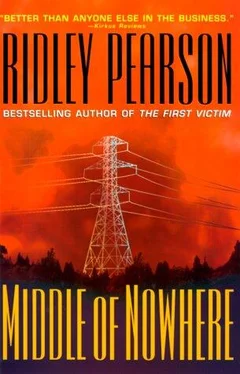Ridley Pearson - Middle Of Nowhere
Здесь есть возможность читать онлайн «Ridley Pearson - Middle Of Nowhere» весь текст электронной книги совершенно бесплатно (целиком полную версию без сокращений). В некоторых случаях можно слушать аудио, скачать через торрент в формате fb2 и присутствует краткое содержание. Жанр: Триллер, на английском языке. Описание произведения, (предисловие) а так же отзывы посетителей доступны на портале библиотеки ЛибКат.
- Название:Middle Of Nowhere
- Автор:
- Жанр:
- Год:неизвестен
- ISBN:нет данных
- Рейтинг книги:4 / 5. Голосов: 1
-
Избранное:Добавить в избранное
- Отзывы:
-
Ваша оценка:
- 80
- 1
- 2
- 3
- 4
- 5
Middle Of Nowhere: краткое содержание, описание и аннотация
Предлагаем к чтению аннотацию, описание, краткое содержание или предисловие (зависит от того, что написал сам автор книги «Middle Of Nowhere»). Если вы не нашли необходимую информацию о книге — напишите в комментариях, мы постараемся отыскать её.
Middle Of Nowhere — читать онлайн бесплатно полную книгу (весь текст) целиком
Ниже представлен текст книги, разбитый по страницам. Система сохранения места последней прочитанной страницы, позволяет с удобством читать онлайн бесплатно книгу «Middle Of Nowhere», без необходимости каждый раз заново искать на чём Вы остановились. Поставьте закладку, и сможете в любой момент перейти на страницу, на которой закончили чтение.
Интервал:
Закладка:
"Lower labor costs?" she asked.
"Look around. Low overhead translates to customer savings."
"Housewives again?"
Rathborne affected that same grimace. "Telemarketing campaigns are much more difficult to facilitate because of the need for networked computers and a shared database. If we used isolated individuals for the telemarketing, the technology requirements would kill us. No, we subcontract. In the case of Consolidated, they're working strictly off demographics. The computers target households based on income and real estate value. The sales rep sees a name, phone number and address on his or her screen. It's slick. Consolidated Insurance owns the Pantheon theater chain. They've installed these new electronic ticket kiosks nationally and wanted to use this campaign as a synergistic way to introduce their targeted insurance sales customers to their theater chain simultaneously. It was my idea, actually, and we've hit a home run, I'm happy to say."
"Subcontract?" Daphne pressed. "To whom?"
"The justice department didn't tell you?" Rathborne asked Boldt. "I assumed that was why you were here. You're Washington State, right? I thought you were looking to model our system out there in Washington… something like that. The state benefits as much as we do."
Daphne said, "Nothing like that. We're Crimes Against Persons. We're working an assault investigation-"
"Now wait a minute here!" the man objected, slipping out of his corporate image. "No one said anything about this. I was told you'd have some questions for me about the Consolidated Mutual campaign," the man said. "I assumed-"
"We have no intention of charging you," Boldt said quickly, "nor anyone else at Newmann Communications. It's more than likely one or two of your employees-these subcontracted sales reps-that we're interested in."
Daphne suggested, "You may have a bad apple."
Another waft of frankfurter-and-mustard invaded the space. Boldt felt sick to his stomach. He clarified, "We would like to speak to this subcontractor. You put us in touch with him and we're out of here."
Daphne repeated, "We have no intention of involving your company in any of this, as long as you cooperate."
"It's all about labor costs-this business. All about putting people on one end of a telephone. The automated programs suck. And Denver? In this boom? You try finding people willing to work on commission."
Daphne inquired, "What are you trying to tell us? All we need is the name of the subcontractor on the Consolidated Insurance campaign."
"I don't understand why they didn't tell you when you talked to them," an irritated Rathborne said. "We've used them for three years now. Never once had a problem."
"When we talked to whom?" Daphne pressed. "Consolidated passed us on to you."
"No! Not Consolidated. The justice department should have told your guys. We use correctional facilities, state prisons, inmates." Rathborne explained, "Our subcontractor for all our telemarketing campaigns is the Colorado Correctional Services."
"Inmates," Boldt mumbled, stunned by the announcement.
Daphne clarified, "You have inmates making your phone solicitations."
Rathborne replied, not without some pride: "Technically, it's part of their rehabilitation."
CHAPTER 26
A sunset flaring red beyond the Continental Divide, Boldt drove the rental through the third guarded entrance to the privately owned prison, coils of razor wire sitting atop the twenty-five-foot chain-link fence. The facility's outer wall rose thirty feet high, its masonry block connecting the four heavily armed guard towers. The middle fence, which was nearly invisible, carried High Voltage warnings on large red and yellow signs. The facility's physical plant-owned and operated by the Etheredge Corporation-housed both maximum and medium detention units, with separate visitor entrances. One of a dozen such compounds nationally, all built and managed by private companies, the correctional services contracted back to the state and were paid for by tax dollars. Etheredge Corporation traded on the NASDAQ. "Prisoners for Profit," Daphne read from a photocopy of a two-year-old article found in the downtown Denver library.
"Keep reading," Boldt said. He had timed their visit to the facility purposefully, knowing that the telemarketing would likely be under way in the evening when the callers could catch families at dinner or watching TV.
She read on. The public had been outraged, the politicians impressed by the prospect of reducing corrections costs. "Unsubstantiated charges" accused "unnamed" state representatives of taking bribes for pushing the private corrections concept through the state legislature. With three such private facilities operating in Colorado and two more under construction, the point seemed moot. Nevada had four, Idaho two. The federal government was getting into the act. Corrections had gone private. Boldt and Matthews intended to play on the fact that Washington State had a similar proposal on a referendum that was scheduled for the fall election.
Boldt found a parking space reserved for visitors. A sign reminded them to lock the car and take the keys.
Corrections, in private hands, had gone high tech. Electronically keyed gates requiring both a guard's handprint and the swipe of a credit-card-size magnetic key permitted access to various areas of the mediumsecurity facility. The floor plan was an octagonal layout that placed the only guard station in a center hub allowing unobstructed views of every cell. Video surveillance, infrared sensors, and electronic "LoJacks" secured around the ankle of every prisoner rounded out the cutting-edge security technology. Evidently Colorado could not afford to build such an elaborate facility, and yet could pay the forty thousand dollars per year to house each prisoner.
Boldt had not approached Etheredge Corporation on his own, knowing full well that no privately held company would appreciate law enforcement discovering a fault with their business plan. Instead, he had used a friend in Washington State Corrections to make the introductory call for them, alleging that a pair of detectives on a fact-finding mission to Colorado were interested in touring Etheredge's Jefferson County Corrections Facility and citing in particular the medium security's so-called private commerce program. Etheredge executives, aware of the impending referendum in Washington State, saw a potential client.
Boldt and Daphne were greeted by the facility's "managing director"-its warden-forty-five, with closecropped hair and a steely glint to his eye. Two administrative assistants, both men in their mid-thirties, reminded Boldt of Army or Marines. Corporations knew where to recruit.
"Impressive," Boldt said, indicating the security through which he and Daphne had just passed. The warden, a talker, a salesman, went against the stereotype. Boldt had difficulty fitting him in with the other wardens he'd known over the years.
The private tour lasted forty minutes, all show-andtell of the facility's high-tech security. The infrared gear was sensitive enough to detect "any mammal with a body temperature above a rat."
"Who else have you toured?" the warden inquired, competition in his blood. He led them down a long, plain corridor.
Daphne pulled out a name from the article she'd been reading aloud only minutes earlier.
The warden nodded. "They came in behind us. Still trying to catch up," he suggested immodestly. "We turned a profit after just four years of operation, don't forget. Nationally, I'm talking about. We maintain ninety-seven percent occupancy. Best bed-to-inmate ratio in the business. Zero escapes in four years of operation. Zero," he repeated. "Nationally!" he said again.
"The private commerce program," Boldt said, assuming this was where he was leading them. He asked, "Does the state share in any of that revenue?"
Читать дальшеИнтервал:
Закладка:
Похожие книги на «Middle Of Nowhere»
Представляем Вашему вниманию похожие книги на «Middle Of Nowhere» списком для выбора. Мы отобрали схожую по названию и смыслу литературу в надежде предоставить читателям больше вариантов отыскать новые, интересные, ещё непрочитанные произведения.
Обсуждение, отзывы о книге «Middle Of Nowhere» и просто собственные мнения читателей. Оставьте ваши комментарии, напишите, что Вы думаете о произведении, его смысле или главных героях. Укажите что конкретно понравилось, а что нет, и почему Вы так считаете.












